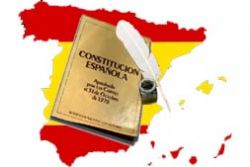- Business
- Childbirth & Education
- Legal Formalities
- Motoring
- Other
- Pensions & Benefits
- Property & Accommodation
- Taxes
- Airports and Airlines Spain
- Paramount Theme Park Murcia Spain
- Corvera International Airport Murcia Spain
- Join us for Tea on the Terrace
- When Expat Eyes Are Smiling
- Meet Wincham at The Homes, Gardens & Lifestyle Show, Calpe
- QROPS 2014
- Spain Increases IHT in Valencia & Murcia
- Removals to Spain v Exports from Spain
- The Charm of Seville
- Gibraltar Relations
- Retiro Park : Madrid
- Community Insurance in Spain
- Calendar Girls
- Considerations when Insuring your Boat in Spain
- QROPS – HMRC Introduces changes that create havoc in the market place
- QROPS – All Change From April 2012
- Liva & Laia : 15th November

PM Mariano Rajoy said on Wednesday that he is willing to reform the Spanish Constitution, on three conditions.
Speaking at a special ceremony inside Congress, where the 39th anniversary of the 1978 Constitution was being observed, Rajoy listed his conditions: there must be broad political consensus, national sovereignty is non-negotiable, and parties must clearly specify which parts of the charter need rewriting.
“I am willing to do this reform, but there are a couple of things I want to make clear. I will in no way accept our national sovereignty being broken up: as far as I’m concerned, whatever affects Spain must be decided by all Spaniards, not just some of them,” said the Popular Party (PP) leader alluding to the Catalan secessionist bid. According to the Constitution, any legal referendum would have to be held at the national level, not just in Catalonia. This voided the controversial independence ballot held in the region on October 1.
“Secondly, it is very important for constitutional reform to take place with a very broad consensus, just like in 1978. A Constitution cannot be overhauled simply with a majority,” added Rajoy.
The Spanish Constitution was approved by 87.78% of voters, including 2.7 million Catalans, at the referendum of December 6, 1978. Catalonia and Andalusia were the two regions where support for the Constitution was most overwhelming.
Rajoy added that “it is also very important for everyone to say exactly what needs reforming.”
The Spanish leader underscored that a study is already underway to develop a new financing system for the regions. Unequal treatment has led to years-long complaints by many regional leaders, particularly with regard to the Basque Country’s special deal, known as the Cupo vasco.
Faced with criticism on this issue by several regional premiers, most notably Andalusia’s Susana Díaz, Rajoy replied that his party has 137 seats in Congress but that 176 are required to approve a new financing system; the PP leader reiterated calls for the main opposition Socialists to support his project.
Recommended Reading :
* Spain's economy to count the cost if Catalan crisis continues
* Constitutional court annuls Catalan independence declaration










